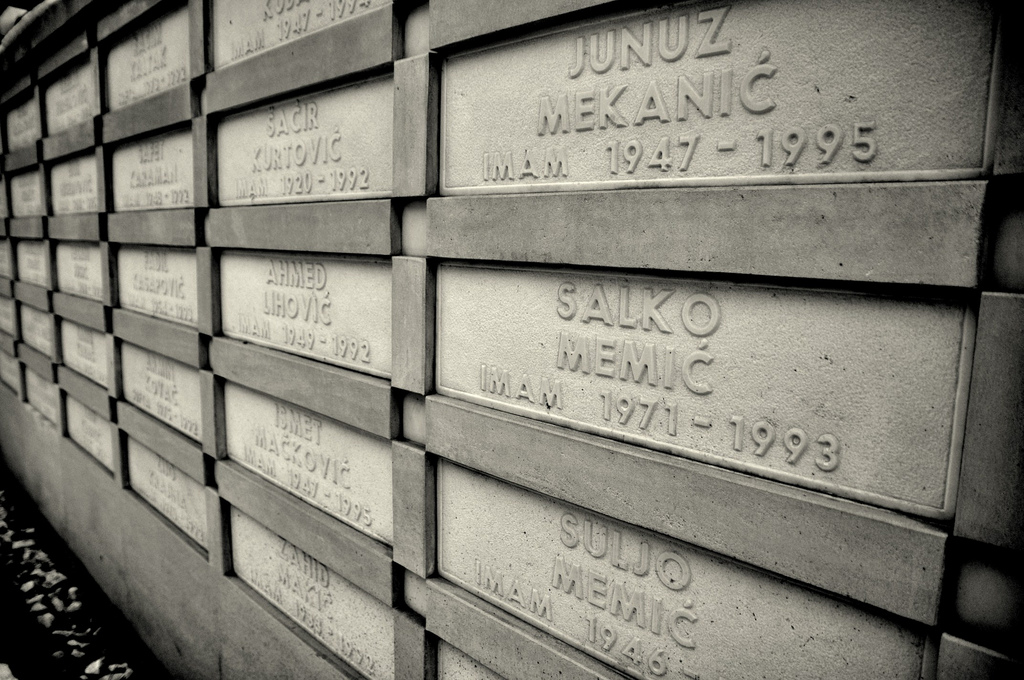Jim Crow in Bosnia and Herzegovina
As part of an on-going debate over reconciliation and reform in Bosnia and Herzegovina, Jasmin Mujanović argues that only a genuine popular mobilization can reverse the trends that have effectively excluded citizens from the practice of politics.
Genocide (2)
With Serbia's new president, Tomislav Nikolic, taking advantage of the accelerating debasement of the word “genocide”, the US and EU should make it clear that Belgrade’s treatment of Srebrenica is a red line.
Bosnia – I have a dream too
TransConflict hereby presents a response to Jasmin Mujanović's article, "A new narrative – why a ‘Bosnian Spring’ is Bosnia’s only hope", calling for a process of reconciliation and steps to foster a spirit of tolerance.
A new narrative – why a ‘Bosnian Spring’ is Bosnia’s only hope
TransConflict is pleased to present a response to a recent article by Dusan Babic, entitled 'The war of narratives', which calls for a new narrative and mobilization that challenges the prevailing politics of division and fear.
The war of narratives
Different historical accounts produce different war-inspired and post-war narratives, particularly narratives of victimhood and collectivised guilt, which undermine attempts to foster tolerance and reconciliation in Bosnia and Herzegovina.
Mostar – heritage reconstruction in a divided city
A new research film by the European CRIC Research Project analyses the unexpected outcomes of heritage reconstruction in Bosnia and Herzegovina, twenty years after the outbreak of war.
Reflections on the siege of Sarajevo
Bosnia and Herzegovina's ethno-nationalist politicians are the product of ethno-nationalist self-partition on the part of three groups of people, all of whom have been scarred by their wartime experiences.
A Bosnian plea – ‘Italians, don’t give the peace prize to Ceric’
The decision by Italy's Ducci Foundation to award Grand Mufti Cerić its peace prizefor his contribution to reconciliation in Bosnia-Herzegovina has sparked a wave of protests from those opposed to his divisive and provocative statements.
Bosnia – between ethnic-nationalism and Europeanization
The process of ethnic-nationalization witnessed in post-war Bosnia and Herzegovina is incompatible with the very norms, values and conditions of European membership.
We need to talk about Mevlid – Vehabije and extremism in Bosnia and Serbia
If overlying, systemic issues are not addressed, then misperceptionsand security rhetoric regarding Wahhabism will put a serious strain on inter-community relations in the Western Balkans.
Separating religion and state in Bosnia
With the role of religion having remained largely ignored in post-Dayton Bosnia-Herzegovina, there is a need to promote a process of secularization by upholding the separation of church and state.
Civil society in Bosnia – obstacle or opportunity?
The marginalization of civil society from Bosnia and Herzegovina's process of transition can, in part, be explained by the dominant ethno-nationalist agenda that has meant that civil society itself has been ethnicized and divided along ethnic lines
About blood and honey
Almost twenty years on from the beginning of the war in Bosnia and Herzegovina, two Dutch journalists are travelling the country seeking answers to the question, does Bosnia and Herzegovina really exist?
Brinkmanship in Bosnia-Herzegovina
Negotiations to form a state-level government in Bosnia-Herzegovina have seen the creation of two new constitutional conventions - the notion of ‘legitimate representation’ and the principle of ‘ethnic rotation’ - which will continue to exert a profound influence on the country's politics.
Bosnia's failing Europeanization process – who is to blame?
The unclear position of EU member states on the required modifications to Bosnia and Herzegovina's constitution has further contributed to the country's deepening political deadlock.
Waiting for Godot in Dodik’s Bosnia
By appealing to the notion of inter-ethnic rotation of senior government positions, Milorad Dodik has exploited and widened divisions between the Bosniaks and Croats, thereby further stymieing the formation of a state-level government.
The importance of being Bosniak
Many Bosniak political and media opinion makers are discovering that their best option involves using a traditional and, in the context of current borders, transnational ethnic movement to improve their leverage with their neighbours and the EU.
Negotiating division and co-operation in today’s Bosnia
The system of government in Bosnia and Herzegovina is characterized by the tension between different types of mutually reinforcing distrust, which make institutional change and the emergence of new elites more difficult than in neighboring countries.
The trouble with transparency
Any long-term improvement in activities currently grouped under the slogan “governance” must include patronage networks as necessary, legitimate actors; otherwise corruption will not diminish, much less go away.
Reconstructing cultural heritage in Bosnia
TransConflict is pleased to present a research paper examining how the city of Tuzla has tried to promote a more united future for Bosnia and Herzegovina by transforming its cultural heritage.
The silent passing of Bosnian proconsulship
By lifting the OHR's remaining bans, Valentin Inzko has quietly conceded that the OHR no longer has the moral authority to dismiss people from public office or to punish them by international decree, thereby marking a profound change in the international community's attitudes towards Bosnia and Herzegovina.
Milorad Dodik and the politics of referendum
Through threats and cajolements, Dodik is proving remarkably adept
The dangerous politics of leverage – Republika Srpska
Dodik's decision to postpone a controversial entity-wide referendum on the decisions of the international high representative will likely amount to yet another postponement of the much needed critical reexamination of the politics of the region and the political institutions of Bosnia and Herzegovina.
The Court of Bosnia-Herzegovina faces "inevitable collapse"
An interview with Matthew Parish, the former Chief Legal Adviser to the International Supervisor of Brčko, on the current political situation in Bosnia and Herzegovina, including the challenges surrounding government formation and the Republika Srpska's proposed referendum on the Court and Prosecutor’s Office.
Bosnia – not your father’s Sporazum
The current politics of “2 against 1” reflect the failure that is Bosnia and the danger that a Dayton arrangement acceptable to none of the country’s players - except maybe for Dodik - could provoke challenges even more unexpected and indelible than those so far evident.









